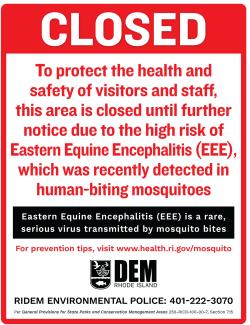DEM Announces Temporary Closure of Recreational Areas in Glocester Due to Elevated Mosquito-Borne Disease Risk
Published on Wednesday, September 13, 2023
PROVIDENCE, RI — The Rhode Island Department of Environmental Management (DEM) today is announcing that it will temporarily close all state-owned recreational properties it manages in Glocester to lessen the risk of campers, hikers, and anglers being bitten by mosquitoes potentially carrying Eastern Equine Encephalitis (EEE). The emergency operation order signed today by DEM Director Terry Gray describes EEE as “an imminent peril to public health, safety, and welfare (that) justifies the temporary closure of the following properties:”
- George Washington State Campground and Bowdish State Boat Ramp (all campers must vacate campsites by Thursday, Sept. 14, at 11 AM and no boat ramp permits to be issued until further notice.)
- George Washington Management Area
- Pulaski State Park and Recreational Area
- Durfee Hill Management Area
“One of DEM’s core values is encouraging people to get outside and enjoy Rhode Island’s scenic natural habitats while hiking, fishing, hunting, or camping, so this is a tough announcement for us to make,” said Director Gray. “Mosquito surveillance efforts, conducted jointly by DEM and the Rhode Island Department of Health, clearly show that the northwestern corner of the state is a hot spot for EEE — although Rhode Islanders should assume that both EEE and West Nile Virus (WNV) are likely present in mosquitoes statewide. For this reason, DEM is temporarily closing recreational facilities in this part of the state until the risk of mosquito-borne disease has subsided.”
Yesterday, DEM and the Rhode Island Department of Health (RIDOH) announced that two new mosquito samples in Glocester tested positive for EEE. One of the samples was trapped Sept. 5 at the George Washington State Campground. To date, Rhode Island reports five positive EEE mosquito samples and one EEE case in a donkey, all originating in Glocester.
Rhode Island’s EEE and WNV risk level is now considered high. Humans can only contract these diseases through a bite from an infected mosquito. Rhode Islanders should continue protecting themselves and their loved ones from mosquito bites until the first hard frost of autumn. Although extremely rare in humans, EEE is very serious and has a much higher human mortality rate than WNV. Approximately 30% of people with EEE die and many survivors have ongoing neurological problems. Unlike WNV, which is prevalent in Rhode Island every year, EEE risk is variable, changing from year to year. For more information on EEE and ways to prevent it, please visit www.health.ri.gov/eee.
Gates to the entrances of these properties will be closed and informational signage will be posted explaining the reason (see above). DEM has posted the notification on its websites, notified its camping reservation vendor of the closure, and is issuing refunds to campers with canceled reservations at George Washington campground.
For more information on DEM programs and initiatives, visit www.dem.ri.gov. Follow DEM on Facebook, Twitter (@RhodeIslandDEM), or Instagram (@rhodeisland.dem) for timely updates.

